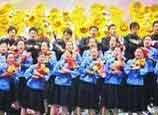
How can different people discard their prejudices and achieve reconciliation in the face of conflict? This was a question that a group of young people from Denmark tried to answer through a unique form of dialogue they invented in 2000 and called "Living Library." After growing in popularity worldwide, it has now come to China.
The living library, also known as a human library, is a social movement that began in Europe when several young Danes had the idea of bringing together people from different cultural backgrounds, nations, educational levels, religions and professions to communicate on the basis of equality to dispel hostility and bias.
At a music festival in 2000, the organizers introduced 75 "books," which were in fact 75 real people with a variety of identities, including a policeman, a Muslim, a stripper, a person living with HIV, an American Indian, and even an extremist far-right Hungarian, to the public, who could be "borrowed" and "read" just like books in a library.
Reading these living books is very simple - each book can talk with readers face to face, and sometimes a small group of readers can read one book. Book and reader discuss, share and debate different thoughts, ideas, lifestyles, religions and living circumstances. Through such readings, they enhance mutual understanding.
Reading festival
Though it was not introduced to China until 2010 in Shanghai, this new type of social activity has been followed by many across the country.
On April 20, a large wave of living library activities was held in 21 Chinese cities ahead of World Book Day. In Guangzhou, 50 living books were presented to 200 readers to read at the same time, setting a new record in China.
More than 800 readers applied to attend the event but only 200 were lucky enough to be selected. The event was divided into four rounds, each lasting 40 minutes. In each round, a maximum of eight readers would read one book together. Each reader would get a borrower's card which listed four "books" he or she would read during the event based on their preferences.
According to Liu Qiongxiong, founder of the LCY Sharing Community, a Guangzhou-based social enterprise which organized this event and one of the earliest groups to be involved in living libraries in China, the purpose of the reading is to provide a platform for different people to get to know each other through in-depth communication.

















 Matchmaking websites crack down on user fraud
Matchmaking websites crack down on user fraud


![]()
